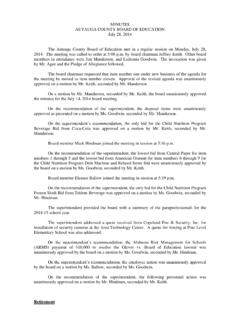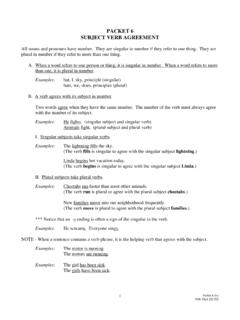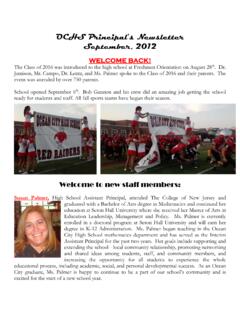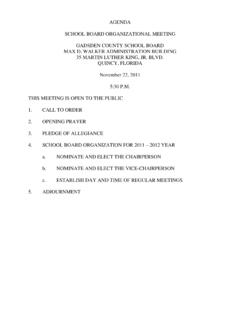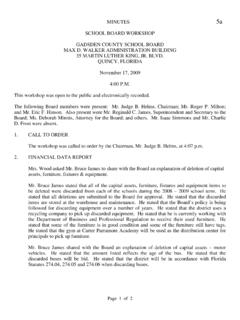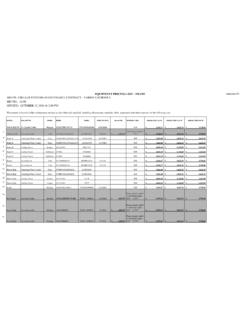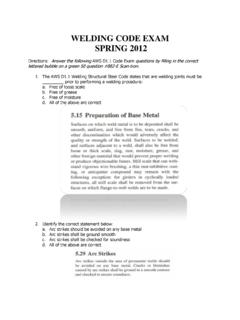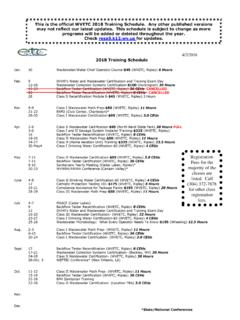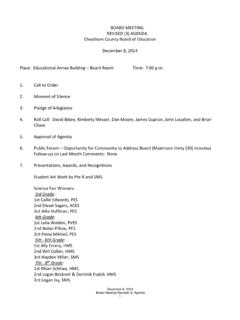Transcription of TENNESSEE DEPARTMENT OF EDUCATION SUMMARY OF …
1 TENNESSEE DEPARTMENT OF EDUCATION . SUMMARY OF child care approval requirements . This is a section by section SUMMARY of the State Board of EDUCATION School Administered child care Rules, Chapter 0520-12-1. child care centers inspected by the DEPARTMENT of EDUCATION must meet the requirements as defined by the rules in Chapter 0520-12-1 to receive a Certificate of approval . The unabridged School administered child care rules are available on the TENNESSEE Secretary of State website, or by writing the Office of School-based Support Services, TENNESSEE DEPARTMENT of EDUCATION , Andrew Johnson Tower, 710 James Robertson Pkwy, Nashville, TENNESSEE 37243-0375.
2 1. Organization and Administration, Chapter Section : A child care Center must have an adequate budget. Records, including health, must be kept on all children. There must be a transportation plan, including the names of persons to whom the child may be released for each child . Staff records must also be kept on each employee that include educational background, reference checks, TBI check, in-service training, physical exams and performance reviews. The center must have their Certificate of approval posted, provide parents with a copy of the policies and procedures & this SUMMARY as well as a pre-placement visit.
3 Parents must have access to all areas of the center when their child is present. The parents must receive an educational program regarding child abuse detection, reporting and prevention. If the center provides transportation, the driver should be appropriately licensed, there must be liability insurance and the children must have adequate space & supervision. Transportation provided by the center or under center authorization shall comply with state law. 2. Staff, Chapter Section : A. Qualifications: The director is responsible for the day to day operations, including staff and program.
4 Another person must be left in charge if the director is out. Any person with a condition that could be harmful to a child or a person convicted of a crime harmful to or involving a child must not be present. Staff must have knowledge of child behavior and development. Staff must be physically, mentally and emotionally stable. All new employees must have orientation and child abuse prevention training before working with the children. The director must have at least a high school diploma and 4 years experience working with children.
5 All caregivers must be 18 years of age and one caregiver in each group must have a high school diploma. Directors must have 18 hours in-service training each year and caregivers 12 hours. B. Supervision and Grouping of Children: Each group must have adult supervision at all times and adult/ child ratios should be followed. There must be a second adult available when more than 12 children are present. Swimming and field trips require ratios be doubled. Each group must have their own space. Infants and toddlers must have their own space and not grouped with older children.
6 At naptime ratios may be relaxed for groups except infants and toddlers. Minimum staffing requirements per groups of children (adult: child ratio) must be maintained. Please refer to ratio charts for specific adult: child ratios for each age group. 3 Equipment, Chapter Section : All equipment must be in good condition and kept clean. There must be age appropriate equipment for all groups with variety. Children must have a place for their belongings. Large pieces of equipment must be secured. Infants are to have space to climb, crawl and pull up that isn't in a playpen or crib.
7 There must be enough equipment so children have choices. There must be an outdoor play area when children are in care for 3 or more daylight hours. Children up to 5 years of age must be offered a naptime if in care for 6 or more hours. For napping children, cots or 2 inch mats must be provided and each child must have a cover to place under them and another available to place over them. Infants must have individual cribs with open tops. 4. Program, Chapter Section : A. Schedule and Routines: Routines such as snacks, meals and naps must occur about the same time of day.
8 Children must have time for free play as well as adult-directed activities. Children must have choices regarding activities and an opportunity to help plan activities. If TV programs, tapes and computers are used, other choices should be available. Parents must be informed of shows and movies to be shown. Staff must monitor computers. Outdoor play must be offered, weather permitting. A rest period must be offered for children up to 5 years of age in care 6 or more hours. Children should be able to form their own sleep patterns.
9 A quiet area must be available for children. B. Behavior Management and Guidance: Caregivers must be knowledgeable of developmentally appropriate behavior. Discipline must be appropriate and redirection should be used when possible. No corporal punishment is allowed. Good behavior must be praised and encouraged. Toilet training shall never be started until a child has been in the program long enough to feel comfortable and is able to communicate his/her feelings. C. Educational Activities: Children must have opportunities for learning, self expression, and participation in activities each day.
10 Activities that provide for both large and small muscle use must be provided. Children must receive child abuse awareness and personal safety information. child care programs shall provide opportunities for learning self expression and participation in a variety of creative activities. D. Nighttime care : If children receive night care , caretakers must provide a calm nurturing environment and a routine hygiene plan must be in place. 5. Health and Safety, Chapter Section A. Children Health: Children must have immunizations in accordance with current TN law and the center must have documentation for this as well as a physical for each infant/toddler.
